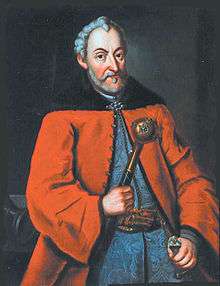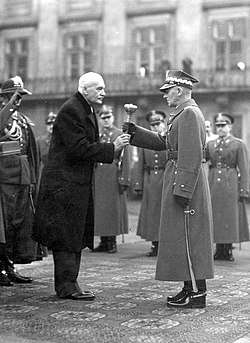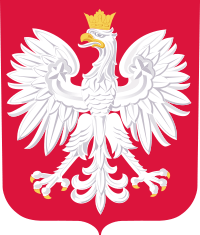Bulawa
The bulava or buława (Polish spelling: buława; Ukraine spelling: булава [bula'va]) is a ceremonial mace or baton.
Poland, Grand Duchy of Lithuania, Polish-Lithuanian Commonwealth
Historically the buława was an attribute of a hetman, an officer of the highest military rank (after the monarch) in the 15th- to 18th-century Kingdom of Poland and the Polish-Lithuanian Commonwealth.
Hetmans typically added an image of a buława to their coats of arms.
Today the buława appears in the rank insignia of a Marshal of Poland.
Ukraine
In the Ukrainian language, a булава (bulava) is a mace or club, in both the military and ceremonial senses. The bulava was part of the Ukrainian Cossack kleinody ("jewels") that were awarded by Hetman Bohdan Khmelnytsky to the Zaporizhian Host.[1]
Historically the bulava was an attribute of a hetman, an officer of the highest military rank, and of the Otaman of Ukraine or the military head of a Cossack state (Cossack Hetmanate).
Under the Ukrainian People's Republic, the General Staff of the Ukrainian Army was called the "General Bulava".
The bulava is now an official emblem of the President of Ukraine, and is housed in Ukraine's Vernadsky National Library.
Gallery

 Edward Rydz-Śmigły (right) receiving marshal's buława from Polish President Ignacy Mościcki, Warsaw, 10 November 1936
Edward Rydz-Śmigły (right) receiving marshal's buława from Polish President Ignacy Mościcki, Warsaw, 10 November 1936- Coat-of-arms (two crossed buławas) of a Polish hetman
- Buława of Crown Field Hetman Kalinowski
 Bulava of Ukraine's Hetman Khmelnytsky, 17th century
Bulava of Ukraine's Hetman Khmelnytsky, 17th century Toy bulavas in a Kiev market
Toy bulavas in a Kiev market 17th-century Russian bulat steel bulava
17th-century Russian bulat steel bulava
